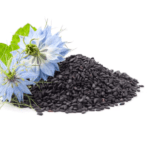In the realm of herbs, rosemary stands as a stalwart, revered for its culinary, medicinal, and aromatic properties. Its fragrant leaves have been cherished for centuries, not only for enhancing the flavor of dishes but also for their myriad health benefits. Let’s delve into the depths of rosemary, exploring its rich history, health benefits, and versatile uses.
A Glimpse into History of rosemary
Rosemary (Rosmarinus officinalis) holds a storied past, dating back to ancient civilizations like the Greeks, Romans, and Egyptians. Revered for its therapeutic properties, it was employed as a symbol of remembrance, often woven into wreaths worn by scholars and warriors. The ancient Greeks believed that rosemary enhanced memory, a notion that persists in folklore to this day.
Nutritional Profile of rosemary
Rosemary boasts an impressive nutritional profile, making it a valuable addition to any diet. It contains vitamins such as vitamin A, C, and B vitamins, essential for immune function and overall health. Additionally, it provides minerals like calcium, iron, and magnesium, vital for bone health and various physiological processes. Rosemary is also rich in antioxidants, including rosmarinic acid and carnosic acid, which help combat oxidative stress and support overall well-being.

Health Benefits of Rosemary
1. Cognitive Enhancement
Rosemary contains compounds that may enhance cognitive function and memory. Research suggests that inhaling rosemary essential oil can improve cognitive performance, making it a potential aid for students during study sessions or individuals seeking mental clarity.
2. Digestive Aid
Traditionally, rosemary has been used to alleviate digestive discomfort. Its carminative properties help soothe the digestive tract, easing symptoms of indigestion, bloating, and gas.
3. Anti-inflammatory Properties
The anti-inflammatory properties of rosemary make it a valuable asset in combating various inflammatory conditions. Regular consumption or topical application of rosemary oil may alleviate symptoms associated with arthritis and other inflammatory disorders.
4. Immune Support
Rich in antioxidants, rosemary supports immune health by combating oxidative stress and bolstering the body’s defenses against pathogens. This may help reduce the risk of infections and support overall immune function.
5. Respiratory Health
Inhalation of rosemary vapor may help alleviate respiratory issues such as congestion, coughs, and bronchial infections. Its expectorant properties facilitate the expulsion of mucus, providing relief from respiratory discomfort.
6. Cardiovascular Health
Preliminary research suggests that rosemary may have benefits for heart health. Compounds found in rosemary may help lower blood pressure and improve circulation, thereby reducing the risk of cardiovascular diseases.
7. Stress Relief
The aroma of rosemary is known to have calming effects, helping to reduce stress and anxiety levels. Incorporating rosemary essential oil into aromatherapy practices or enjoying a cup of rosemary tea can promote relaxation and mental well-being.

Culinary Uses of rosemary
Beyond its medicinal properties, rosemary adds depth and flavor to culinary creations. Whether used fresh or dried, its robust aroma and pine-like taste elevate dishes ranging from meats and poultry to soups and stews. Infusing olive oil with rosemary creates a versatile seasoning for salads and marinades.
1. Aromatic Delight
The fragrant essence of rosemary transcends its culinary and medicinal applications, finding use in aromatherapy and perfumery. Rosemary essential oil, derived from the plant’s leaves, is prized for its invigorating scent, which uplifts the spirit and promotes relaxation.
2. Beauty and Personal Care
Rosemary’s beneficial properties extend to the realm of beauty and personal care. Incorporating rosemary-infused products into skincare routines can help cleanse and rejuvenate the skin, while rosemary-infused hair treatments may promote scalp health and stimulate hair growth.
3. Precautions and Considerations
While generally safe for consumption and topical use, individuals with certain medical conditions or sensitivities should exercise caution. Pregnant women, in particular, should consult with a healthcare professional before using rosemary supplements or essential oils.
Conclusion
Rosemary emerges as a multifaceted herb endowed with an array of health benefits and uses. From enhancing cognitive function to enlivening culinary creations and promoting overall well-being, its versatility knows no bounds. Whether brewed into a fragrant tea, infused into oils, or sprinkled atop savory dishes, rosemary continues to captivate and inspire, a timeless emblem of vitality and vitality.
Incorporate this aromatic herb into your daily routine and experience firsthand the wonders it has to offer, enriching both body and soul with its botanical brilliance.
Topics covered:
- What is Rosemary?
- What are key nutrients in Rosemary?
- What are health benefits of Rosemary?
- What are uses of Rosemary?








1 thought on “The Versatile Herb: Unveiling the Health Benefits and Uses of Rosemary”